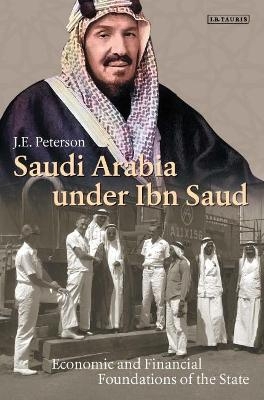
Saudi Arabia under Ibn Saud
I.B. Tauris (Verlag)
978-1-78453-900-9 (ISBN)
At its founding in 1932, the Kingdom of Saudi Arabia was characterized by tribal warfare, political instability, chronic financial shortages and economic crises. As a desert chieftain, Abd al-Aziz Ibn Saud, the ruler and king until 1953, had the skills, the cunning and the power to control the tribes and bring peace to this realm. But financial and economic matters were not his forte and these he left mostly to a single individual, Abdullah al-Sulayman al-Hamdan. He was entrusted with nearly all of the country’s early financial dealings and administrative development. The Ministry of Finance, which he headed from its inception, served as nearly the sole government agency dealing with a wide variety of matters, many of which had only a peripheral connection to finance or the economy. This book examines the role of the Ministry of Finance and its minister, Abdullah al-Sulayman, in holding the country together financially and administratively until the promise of substantial oil income was realized a few years after the end of World War II. It will be essential reading for anyone interested in Gulf History and the Economic History of the Middle East.
J.E. Peterson is a historian and political analyst specializing in the Arabian Peninsula. He has taught at various universities including Bowdoin College, the College of William and Mary, the University of Pennsylvania, Portland State University and SciencesPo; and has been associated with a number of leading research institutes in the United States and the United Kingdom. Until 1999, he served in the Office of the Deputy Prime Minister for Security and Defence in Muscat, Sultanate of Oman. He is currently affiliated with the Center for Middle Eastern Studies at the University of Arizona and is the author or editor of a dozen books and monographs, including most recently Historical Muscat: An Illustrated Guide and Gazetteer; Oman’s Insurgencies: The Sultanate’s Struggle for Supremacy; The GCC States: Participation, Opposition, and the Fraying of the Social Contract; The Emergence of the Gulf States: Studies in Modern History and a third edition of Historical Dictionary of Saudi Arabia.
List of Illustrations
Preface
Glossary
Abbreviations
1. Saudi Arabia in the Twentieth Century
The Kingdom of Saudi Arabia
Origins of Government Administration and Financial
Requirements
PART I FINANCES AND OIL BEFORE WORLD WAR II
2. The Organization of State Finances
Control of the Treasury in the Early 1920s
Control of Finances in al-Hijaz and the Directorate from 1927
Controller of National Finances and the Financial Authority
(al-Wikalah) (1927 – 9)
Establishment of the Ministry of Finance (1932)
Administering Finances During the Great Depression
3. The 1933 Oil Concession and Oil Affairs to World War II
Early Oil Exploration in Arabia
The Role of Charles Crane and Karl Twitchell
The Original 1933 Concession
Further Developments in the ARAMCO Concession
4. Early Administrative Arrangements
Military and Defense
Air and Transport
Foreign Affairs
Hajj Administration
Mining Activities
Electricity and Water Supply
Other Ministry of Finance Responsibilities
PART II THE IMPACT OF WORLD WAR II
5. British Wartime Assistance and the Emergence of Anglo-American Rivalry
The Inception of British Wartime Subsidies
The Kingdom’s Dire Internal Situation in 1942 – 3
Issues with the British Subsidy for 1944
The US Supplants British Influence with the 1945 Subsidy
6. The Beginnings of the US – Saudi Partnership
The Historic Meeting between King ʿAbd al-ʿAziz and President Roosevelt
Wartime Subsidies and Lend – Lease Assistance
Military Provisions and the Dhahran Air Base Agreement
7. Administrative Developments
Endeavors in Agriculture
Continuing Developments in Foreign Affairs and Defense
Banking and Currency
Development Projects
Miscellaneous Activities
PART III POSTWAR PROSPERITY AND ECONOMIC DEVELOPMENT
8. Oil Emerges as the Financial Engine
Oil Company Relations During the War
TAPline and Other Oil Concerns (1946 – 9)
Financial Relations between the Saudi Arabian Government and ARAMCO (1946 – 9)
Oil Negotiations and Related Matters (1950 – 4)
Other Financial Relations between the Saudi Arabian Government and ARAMCO (1950 – 4)
Onassis and the SATCO Affair of 1954
9. Postwar Stringencies and the Push for Development (1945 – 9)
A New Normalcy After the War
Establishing a Controlled Budgetary Process and Spearheading Socioeconomic Development
10. The Broad Remit of the Postwar Ministry of Finance
The Establishment of the Saudi Arabian Monetary Agency
Mining Activities and Transport
Saudi Employees in ARAMCO
Agriculture
Other Responsibilities
11. The Emergence of Prosperity (1950 – 4)
Finances and Currency Reform
Development Projects
The Expansion of Government Administration
The Ministry of Finance in the Transition from King ʿAbd al-ʿAziz to King Saʿud
Notes
Bibliography
Index
| Erscheinungsdatum | 08.08.2017 |
|---|---|
| Reihe/Serie | Library of Middle East History ; 75 |
| Zusatzinfo | 2 maps, 4 tables |
| Sprache | englisch |
| Maße | 156 x 234 mm |
| Themenwelt | Geisteswissenschaften ► Geschichte ► Regional- / Ländergeschichte |
| Geschichte ► Teilgebiete der Geschichte ► Wirtschaftsgeschichte | |
| Sozialwissenschaften ► Soziologie ► Spezielle Soziologien | |
| Wirtschaft ► Allgemeines / Lexika | |
| ISBN-10 | 1-78453-900-7 / 1784539007 |
| ISBN-13 | 978-1-78453-900-9 / 9781784539009 |
| Zustand | Neuware |
| Haben Sie eine Frage zum Produkt? |
aus dem Bereich


